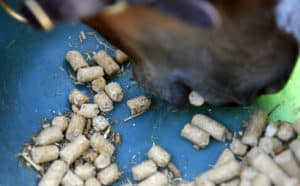
Understanding Energy Content in Horse Feeds
Find out why horse feed labels don’t simply list calorie content.

Find out why horse feed labels don’t simply list calorie content.

Not all carbohydrates are created equal, and “low-carb” definitely doesn’t mean “no-carb.” A nutritionist explains.

Knowing elimination risk factors can help veterinarians, riders, and trainers make informed decisions to safeguard endurance horse welfare, researchers say.

Practitioners must use clinical signs and laboratory testing to distinguish between these sometimes similar ailments.

Learn more about nutrition’s role in the development and management of equine endocrine disorders and how you can reduce your horse’s risk of developing a secondary disease.

Low-intensity swimming could help maintain glucose and insulin levels without putting excess strain on horses’ limbs.

Researchers say this seems to confirm lore that some horse breeds are more susceptible to EMS than others.

Researchers explored if hyperinsulinemia and laminitis severity are correlated in horses recently diagnosed with PPID.

Carbohydrates are the main source of dietary energy for horses and are important for fast, quick-burning power.
Equine lecture topics will include feeding endocrine-challenged horses, allergies, equine aging, supplements, and more.

Researchers have made great strides in understanding laminitis, but it remains a difficult disease to predict and treat.

Researchers identified several disease predictors, including advancing age, laminitis, and a cresty neck, among others.

Off-track Thoroughbreds have special nutritional needs as they begin transitioning to new careers.

Researchers hope the test will help them predict laminitis risk based on ponies’ insulin responses to food.

Elzinga hopes to gain a better understanding of mechanisms that could predispose a horse to developing laminitis.

Researchers say the uterine environment can significantly impact a foal’s future bone health, metabolism, and more.
Stay on top of the most recent Horse Health news with
© 2022 Copyright Statement dolor sit amet, consetetur sadipscing User Terms, sed diam nonumy eirmod tempor invidunt ut labore et dolore magna aliquyam erat, sed diam voluptua. At vero eos et accusam et justo duo dolores et ea rebum. Stet clita kasd gubergren, no sea takimata sanctus est Lorem ipsum dolor sit amet.
"*" indicates required fields